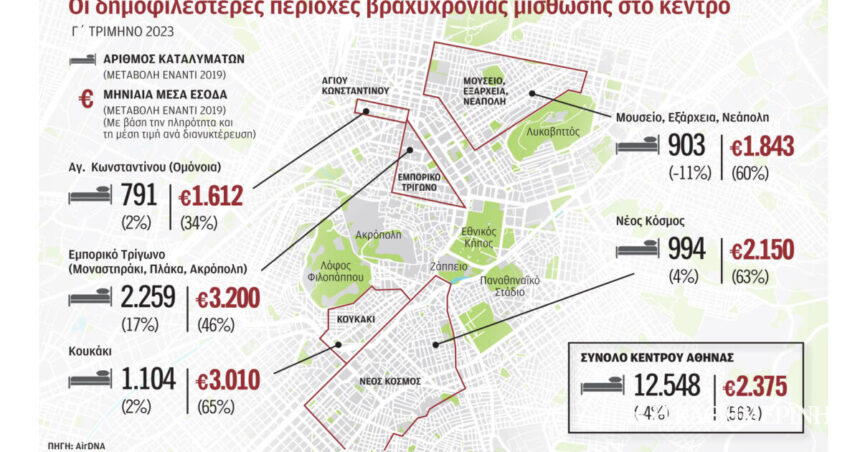Increased by 33% was the amount declared in tax office (in the tenth month of the year) by the owners who are active in short term rental. This increase is the result of the better course of tourism and the demand recorded, the new apartments that have been added to the short-term leases, but also the appearance of incomes from owners who until now operated outside the institutional framework. According to her data AADEduring the period of January – October of the year 2023 compared to the corresponding period of the year 2022, there was a percentage increase in the submitted declarations by 36%, namely from 1,247,904 to 1,695,957 declarations, as well as an increase in the declared rents by 167,404 .869 euros, from 510,078,380 to 677,483,249 euros.
However, from an earlier research by Grant Thornton, which was presented at a conference of the Hellenic Chamber of Hotels, the tourist expenditure on short-term rentals is estimated at 1.38 billion euros. This difference is huge compared to the data available from AADE, while it is even greater if compared to the data of AirDNA, where in 2022 there were 11.5 million overnight stays with an average price of 193 euros. It is noted that an updated memorandum of cooperation (MoU) was signed between AADE and the Airbnb, Booking and Vrbo (Expedia) platforms. Changes were agreed, which lead to the qualitative and quantitative upgrading of the data exchanged with the aim of their more effective management by AADE, in order to fully ensure the identification of accommodation managers for compliance and control purposes.
High fines
Under the new framework, which comes into force from January, violators will face stiff fines if they fail to register with Registry of Short-Term Rental Properties. Specifically, the fine for non-registration in the Short-Term Rental Real Estate Register is set, per use, at 50% of the gross income and a minimum of 5,000 euros (until 2023 the fine was horizontal and reached 5,000 euros). In case of recurrence, for the next use the above fine will be doubled.
The income obtained by natural persons, from the short-term rental of real estate, is taxed according to the scale of real estate income, namely:
• 0-12,000 euros: 15%.
• 12,001-35,000 euros: 35%.
• 35,001 euros and above: 45%.
Legal entities active in short-term rentals are taxed at 22% from the first euro, after deducting the relevant costs.
It is noted that the new changes in the tax framework of short-term leases have been in force for 12 days. Under the new framework, natural persons owning three or more short-term rental properties will be required to start a business, keep books and issue tax information. Also, as is natural for all self-employed, they will be charged with the prescribed insurance contributions, with a self-employment fee and with VAT from the first property. The accommodation fee for transients, which is 0.5% of revenue, is also extended to short-term leases. There is also a maximum duration of 60 days on each short-term rental. It is noted that the limit of 60 days concerns the duration of each lease separately.

End of durability
The accommodation tax which is currently imposed on hotels and rooms for rent is abolished and replaced by the “resilience fee to the climate crisis”, which will additionally burden short-term rentals with 1.5 euros per day (under conditions it will reach 10 euros) . The fee is imposed per daily use and per room or apartment, during the months of March to October, as follows:
• In properties available through short-term rental: 1.50 euros.
677,483,249 euros were declared to the tax office out of 510,078,380 in the corresponding period of 2022.
• If the properties available through short-term lease are single-family houses over eighty 80 sq.m., a durability fee of 10 euros is imposed.
• During the months of November to February, the fee is set at 0.50 euros.
• If the properties available through short-term lease are single-family houses over eighty 80 m2, a durability fee of 4 euros is imposed in the months of November to February.

How many are active?
Based on the data of the AADE, 168,819 properties belonging to 107,719 VAT numbers (legal entities and natural persons) are registered in the Register of Short-term Accommodation Properties. From those:
• 27,367 properties belong to 5,297 legal entities.
• 141,452 properties belong to 102,422 natural persons.
• Of these, up to 2 properties are owned by 94,982 natural persons (92.7% of natural persons).
• 3 or more properties have 7,440 natural persons and correspond to 30,329 properties.
From January 1, 7,440 natural persons and 5,297 legal entities with 57,696 properties (34.2% of properties) will be required to pay VAT.

The controls of AADE
Within the month, the first inspections of property owners are expected to begin.
According to the plan of the Independent Public Revenue Authority (AADE) a second check will be carried out, in order to establish the degree of compliance of those who rent properties through the platforms and it will be checked if they have registered the Property Registry Number (RMA). The main objective is to identify taxpayers who hide from the tax authorities the real income from short-term rentals or who rent and have not registered on the digital platform, i.e. they do not have a Property Registry Number.




